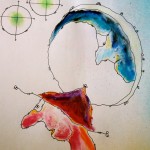 As I write this, I’m gearing up for a modest book tour to promote my new work Ageless Soul. Whenever I write a book, I look for fresh insight into the theme. Insights are not easy to come by and take a lot of reading over a range of genres and authors, solid conversations with friends, and a background of good teachers and mentors. The modern taste for quantified research doesn’t appeal to me, mainly because it isn’t aimed at insight but at proof. It seems to be rooted in anxiety about trusting your intuitions and reflections.
As I write this, I’m gearing up for a modest book tour to promote my new work Ageless Soul. Whenever I write a book, I look for fresh insight into the theme. Insights are not easy to come by and take a lot of reading over a range of genres and authors, solid conversations with friends, and a background of good teachers and mentors. The modern taste for quantified research doesn’t appeal to me, mainly because it isn’t aimed at insight but at proof. It seems to be rooted in anxiety about trusting your intuitions and reflections.
In writing Ageless Soul I took up familiar themes, such as retirement, illness, loneliness, legacy and the longing for youth, and sought out fresh insights. It gives me special pleasure to find a point of view that upends the standard assumptions. For example, I always use a principle I learned from the archeypal psychologist James Hillman: Go into the symptom. Don’t try to get rid of it. I remember co-teaching with him in the 1980’s, both of us advising that people do what they can to preserve and protect their symtoms. In them are the secrets to a better life.
In the current book I applied the principle to loneliness, and I thought, maybe the best way to deal with loneliness is to be alone, to see youself as an individual, not so conditioned by society, and enjoying extended times of solitude. Sometimes it may help to be surrounded by people, but everyone knows that you can be lonely in a crowd. Olivia Laing wrote about this phenomenon beautifully in her book The Lonely City.
As often happens, I finish a book and know that it’s being printed and packaged, when a new insight comes along. I can talk about it on my book tour and in interviews as an added benefit. It’s not in the book, and so I have something to say that you can’t find in the book. Authors know that a book is like a small vessel into which you tried to cram as many insights as came to you at the time of writing. But the book is only a portion of what could have been written.
All of this is preamble to a dream I had this week that gave me another insight into aging. It’s not in the book. In the dream my wife is looking out a half-open window and is calling for Julia. I’m watching the scene and know that Julia is her young daughter (there is no Julia in life that either of us recall). I can tell that my wife is suffering the loss of her daughter, and the dream feels profoundly sad.
In my practice I use dreams regularly, making them the center of the work. They are like x-rays, showing themes that are invisible in ordinary life and yet, upon reflection, important in shaping the direction of a life. In dream work, I am most influenced by the work of C. G. Jung, James Hillman and Patricia Berry, all of whom may well take note of parallels between dream images and elements of mythology. About an hour after waking up, I suddenly realize that my dream seems to echo the myth of Demeter and Persepone. I have read about the deep psychological meaning of this myth in Patricia Berry’s writing and have referred to it frequently in many dreams women have presented to me.
In the myth, Persephone is the young daughter, innocent and carefree, one day out picking flowers when the earth opens up in a massive and terrifying cataclysm and Hades, Lord the Underworld, appears and snatches away the young girl. Demeter realizes that her daughter is missing and becomes both inconsolably sad and angry.
I often think of this dream in the lives of women I counsel. They are losing their innocence, becoming deeper and stronger people, and are sad to see their youth fade away. I understand the process as one of preparing them to be queen of their underworld, their own depth, just as Persephone became queen with Hades.
So I wondered about my dream. Is this a dream of aging, about the loss of my youth. I’m coming up on my 77th birthday and, though I feel quite young, I can’t escape the shadow of old age coming over me. Is this dream a reflection of my aging? In my book I write about melancholy and sadness as a natural part of the aging process, distinguishing it from depression. My dream makes me wonder if there is, though, a Demeter kind of depression that comes along with the loss of the young girl psyche, my own innocence and purity of heart. Is this a deep part of aging, too: the Demeter/Persephone myth making its appearance in a life, signaling a difficult and painful deepening of character?














